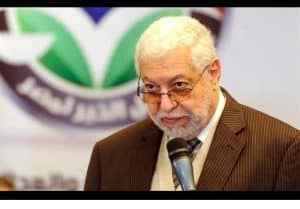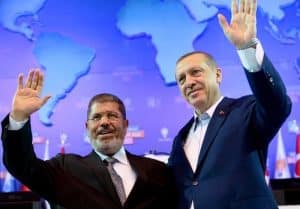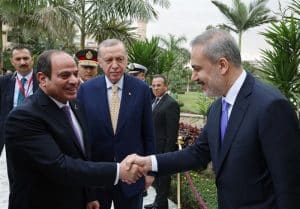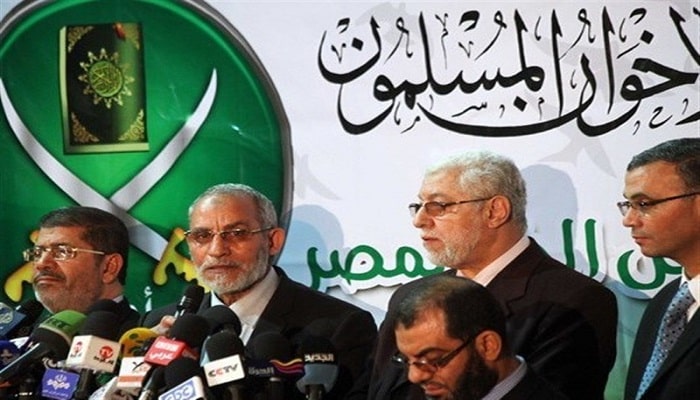PNN – The students of the late Arbakan considered the cancellation of the Turkish citizenship of one of the leaders of the Muslim Brotherhood on the order of Erdoğan as a shameful act.
According to the report of Pakistan News Network, these days, once again, we are witnessing new developments in the field of Turkey’s foreign policy, and one of the signs of the beginning of a new era is the significant actions of Erdogan’s government regarding the leaders of the Muslim Brotherhood.
The story is that after the visit of Turkish President Recep Tayyip Erdogan to Cairo, Egypt, the Turkish citizenship of one of the leaders of the Brotherhood has been revoked. According to the media, the Ministry of Interior and the Ministry of Foreign Affairs of Turkey took a measure to revoke Mahmoud Hossein’s Turkish citizenship on the order of Erdogan.
This is despite the fact that previously, by the order of Erdogan himself, this Egyptian brotherhood politician was given a birth certificate and Turkish citizenship, and a luxurious office in Istanbul was available to him.

Turkish analytical news site T24, which belongs to Erdogan’s opponents, in a sarcastic article entitled “My Brother Sisi”, introduced Erdogan as a self-interested and unpredictable politician and wrote: “Until a few months ago, Erdogan constantly considered himself the defender of my brother Morsi and threatened the dictator and coup plotter Sisi as the cause of his death. But now we have reached the phase of friendship with Sisi, and during his trip to Cairo, he used the phrase “my brother Sisi” many times.
From Istanbul-London dispute to Erdogan-Sisi agreement
Qar newspaper wrote from the media close to Ahmet Davutoglu and Abdullah Gul: Turkish President Recep Tayyip Erdogan visited Egypt after 12 years. Some commentators have published comments that show that Erdogan’s decision to revoke the Turkish citizenship of the Secretary General of the Muslim Brotherhood was in line with Sisi’s wishes. Although Erdoğan’s visit has the potential to open a new page in the relations between the two countries, clearly, concerns and ambiguities about the status of members of the Muslim Brotherhood and other Egyptian dissidents are increasing. It is not clear whether they will be able to travel to Turkey from now on.”

The newspaper also pointed out that Erdogan’s team closely monitored the internal disputes of the Muslim Brotherhood in Egypt and practically put the Istanbul group against the London group.
Following the differences after the coup, the conflicts within the Brotherhood gained new dimensions with the death of Ibrahim Munir. The disagreement between the Istanbul and London fronts regarding the authority of the General Secretary increased the internal conflicts of the movement. Now another variable factor called the effect of the Erdoğan-Sisi agreement has been found, and this issue may affect the fate of the Brotherhood.
Erbakan’s students’ impression of Erdoğan’s actions
National newspaper Gazete, the media organ of the Islamist party of Saadat, has also criticized Erdogan’s behavior. This newspaper, which belongs to the old students of the late Najmuddin Arbakan, considered the cancellation of Mahmoud Hossein’s citizenship as a shameful act and expressed his impression of this decision.
This newspaper said that Mahmoud Hossein Ahmed Hassan, the secretary general of the Egyptian Muslim Brotherhood movement, is a religious figure and a political fighter, and it is a shame that Turkey stopped supporting such people at Sisi’s request.
In an analytical note written by Bakr Shirin, Meli Gazete criticized Erdogan’s government’s policies and wrote: “Our teacher, the late Najmuddin Arbakan, never accepted the Zionists as a government and never used the term “Israeli government”. But now our country has an official and diplomatic relationship with the Zionists.
In the continuation of this report, Lotfi Yalman, one of Arbakan’s old students, wrote: “Master Arbakan, the leader of the National View Party, paid attention to the establishment of the Islamic system and the Qur’an and announced that brotherhood and empathy in the Islamic world are of vital importance to us.” Are others going too?

One of the important questions regarding the future relationship between Turkey and the Muslim Brotherhood is what will happen to other Brotherhood politicians living in Turkey. Currently, there are no statistics on the presence of foreign politicians of the Brotherhood in Turkey.
For example, Khalid Khoja, the former head of the Syrian opposition who studied in Turkey, is one of the politicians that Erdogan’s government invested in. But in addition to Khojay Turkmen and the Syrian Brotherhood, hundreds of politicians from Egypt, Tunisia, Palestine, Libya, Saudi Arabia and other countries have lived in Turkey in the past years, and now it is not clear what they will do.
At the beginning of 2023, several political and media figures of the Egyptian Brotherhood, at the request of the Erdogan government, ended their activities against the government of Abdel Fattah Sisi, and some of them also left Turkey.
Now it is predicted that other groups of brotherhoods of the African continent will gradually leave Turkey. The evidence shows that the process of normalizing Turkey’s relations with the Zionist regime, as well as Turkey’s relations with the Egyptian government, will affect the possibility of Brotherhood activity in Turkey.

